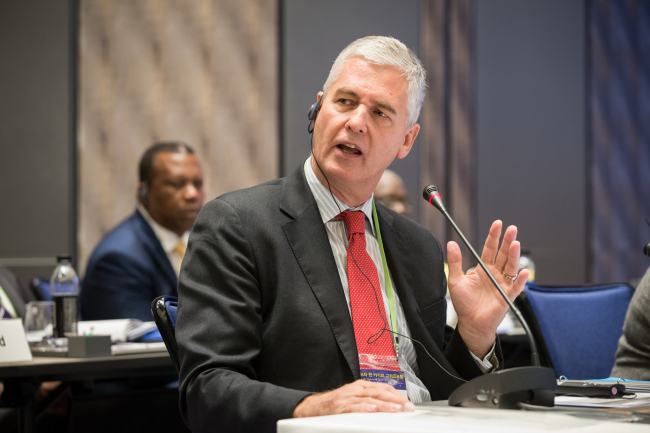GGGI head tells Korea to focus on ‘cheap’ renewable energy
By Kim Da-solPublished : Oct. 10, 2017 - 17:01
With increased interest in clean energy around the globe, now is the time for countries to jump into action, said the head of Global Green Growth Institute, a Seoul-based global organization on environmental-friendly development.
Frank Rijsberman, the GGGI’s director-general, also urged Korea to focus on renewable energy sources such as solar and wind power.
Frank Rijsberman, the GGGI’s director-general, also urged Korea to focus on renewable energy sources such as solar and wind power.

“(It’s time for) South Korea to demonstrate how to develop renewable energy sources and invest in green growth,” Rijsberman said during an interview with The Korea Herald.
The GGGI was launched in 2010 with the goal of bridging the rich and poor by sharing funding and technological know-how for environmentally friendly development. It seeks to introduce comprehensive planning frameworks for each member country. It has 26 donor and recipient member states working on 34 programs in 24 countries.
“It’s also our mission to support green mechanisms and make sure actions are on the ground,” the director-general said.
With South Korean President Moon Jae-in pushing to increase the use of renewables to 20 percent of the country’s total power generation by 2030, the country needs to focus on energy sources that are becoming cheaper, the GGGI chief stressed.
“The biggest advantage of renewable energy is that it’s cheap. Korea is one of the OECD member countries that has the lowest renewable energy source use rate despite its severe fine dust problem derived from using fossil fuels.”
Rijsberman said over the past 18 months, the price of solar energy fell by 70 percent -- it is on track to becoming the cheapest energy source and beating out fossil fuels.
With regard to the government subsidies given to households and building owners for the installation of solar power grids here, he made it clear that the government should rethink the program.
“Many countries have the government to provide subsidies for power grids, but it has become so cheap that they do not need to.”
Currently, the Seoul Metropolitan Government is funding 415,000 won ($363) for the installation of one 1.6-meter-wide and 0.9-meter-tall solar power panel at home. The resident pays the remaining 200,000 won, or can get additional subsidies from the district office.
On worries that solar power grids are not quite reliable for widespread use, he said the key is innovation.
“Part of that can be solved by connecting the grid with smart grid software. Korea is the world’s strong battery builder so it’s well placed to develop such programs,” he said.
With renewable energy entrepreneurs like Elon Musk -- who runs a solar panel firm that specializes in efficiently storing large amounts of electricity in power banks -- solar grids for battery storage will be a “big game changer,” he said.
Moving toward the paradigm of practical and cheap energy, Korea will go through similar discussions on nuclear power plants that climate leaders had in European countries, he said.
“European countries also had (a) hard time meeting energy requirements, just like here in Korea.
“Sometimes those shifts in society require a lot of discussion and there is a lot of resistance from implementing the system. Korea will go through various discussions and observations.”
With global efforts underway to enforce the climate accord reached in Paris, the GGGI is hosting Global Green Growth Week 2017 together with the Government of Ethiopia in Addis Ababa from Oct. 17 to 20.
World climate leaders will discuss topics such as climate finance; bankable projects in developing countries; the sustainable management of resources to address water and food security challenges; and the development of policies that drive environmentally sustainable and socially inclusive economic growth.
By Kim Da-sol (ddd@heraldcorp.com)


![[Exclusive] Korean military set to ban iPhones over 'security' concerns](http://res.heraldm.com/phpwas/restmb_idxmake.php?idx=644&simg=/content/image/2024/04/23/20240423050599_0.jpg&u=20240423183955)




![[Herald Interview] 'Amid aging population, Korea to invite more young professionals from overseas'](http://res.heraldm.com/phpwas/restmb_idxmake.php?idx=644&simg=/content/image/2024/04/24/20240424050844_0.jpg&u=20240424200058)
![[Pressure points] Leggings in public: Fashion statement or social faux pas?](http://res.heraldm.com/phpwas/restmb_idxmake.php?idx=644&simg=/content/image/2024/04/23/20240423050669_0.jpg&u=)










